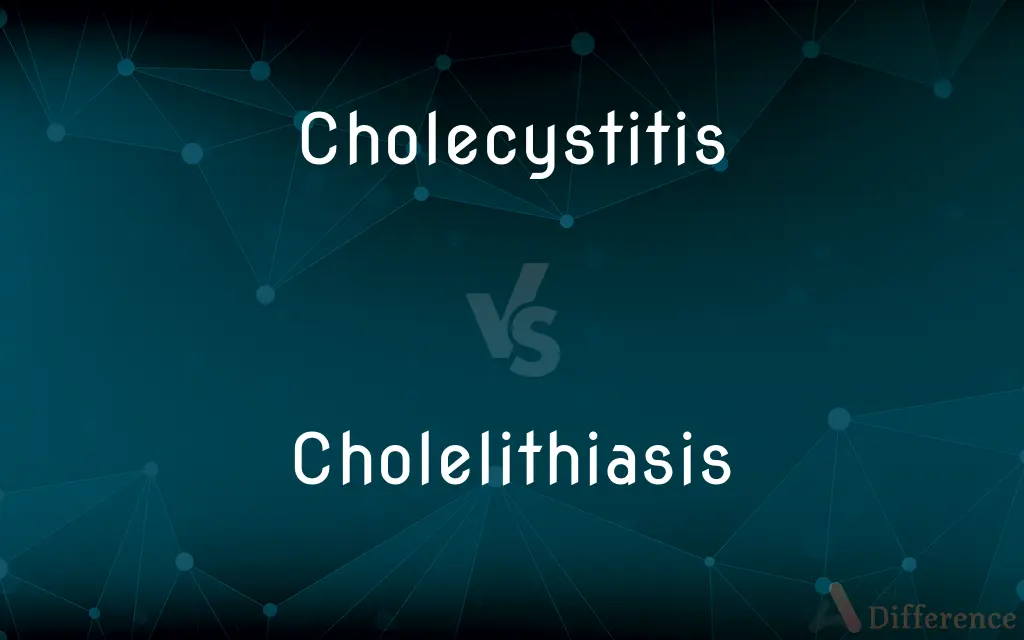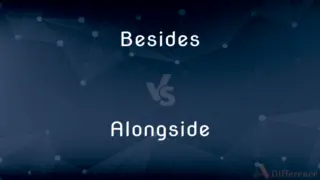Cholecystitis vs. Cholelithiasis — What's the Difference?
Edited by Tayyaba Rehman — By Fiza Rafique — Published on October 18, 2023
Cholecystitis is inflammation of the gallbladder, while Cholelithiasis refers to the presence of gallstones.

Difference Between Cholecystitis and Cholelithiasis
Table of Contents
ADVERTISEMENT
Key Differences
Cholecystitis primarily denotes the inflammation of the gallbladder, a small digestive organ. Cholelithiasis, however, refers to the formation or presence of stones, known as gallstones, within the gallbladder.
Often, Cholecystitis can be a result of Cholelithiasis, as gallstones block the bile ducts, causing inflammation. However, Cholelithiasis can exist without causing Cholecystitis, meaning a person can have gallstones without any inflammation.
Both conditions can present with abdominal pain, particularly in the upper right side, but Cholecystitis tends to be more acute and severe. While Cholelithiasis might require surgical intervention if it leads to symptoms or complications, Cholecystitis often necessitates more immediate medical attention due to the acute inflammatory process.
Comparison Chart
Definition
Inflammation of the gallbladder
Presence of gallstones in the gallbladder
Cause
Often due to gallstones or blockage
Precipitation of bile components
ADVERTISEMENT
Symptom severity
Generally more acute and severe
Can be asymptomatic or mildly symptomatic
Treatment urgency
Often requires immediate attention
Might require intervention if symptomatic
Possible Complications
Abscess, gangrene, perforation
Gallbladder blockage, leading to Cholecystitis
Compare with Definitions
Cholecystitis
Can lead to complications if not treated.
Untreated Cholecystitis might result in a perforated gallbladder.
Cholelithiasis
The presence of gallstones in the gallbladder.
An ultrasound confirmed she had Cholelithiasis.
Cholecystitis
Typically presents with acute pain in the upper right abdomen.
The patient's symptoms of sharp pain were consistent with Cholecystitis.
Cholelithiasis
Risk factors include obesity, pregnancy, and rapid weight loss.
Her doctor said her rapid weight loss might have contributed to Cholelithiasis.
Cholecystitis
A condition often resulting from bile duct obstruction.
The blockage from the gallstone led to Cholecystitis.
Cholelithiasis
Can be asymptomatic or cause mild discomfort.
Even though he had Cholelithiasis, he felt no pain.
Cholecystitis
Often necessitates medical intervention.
Due to her Cholecystitis, she underwent a surgical procedure.
Cholelithiasis
Can lead to complications like Cholecystitis.
Her Cholelithiasis eventually progressed to Cholecystitis.
Cholecystitis
Cholecystitis is inflammation of the gallbladder. Symptoms include right upper abdominal pain, nausea, vomiting, and occasionally fever.
Cholelithiasis
Result of the precipitation of bile components.
Cholelithiasis occurs when bile components form solid stones.
Cholecystitis
Inflammation of the gallbladder.
Cholelithiasis
The presence or formation of gallstones in the gallbladder or bile ducts.
Cholecystitis
(disease) An inflammation of the gall bladder.
Cholelithiasis
(medicine) gallstones
Cholecystitis
Inflammation of the gall bladder
Cholelithiasis
The presence of gallstones in the gallbladder
Common Curiosities
What is Cholecystitis?
Cholecystitis is the inflammation of the gallbladder.
Are there any symptoms for Cholelithiasis?
It can be asymptomatic or cause mild abdominal discomfort.
What are symptoms of Cholecystitis?
Symptoms include severe abdominal pain, fever, nausea, and vomiting.
How is Cholecystitis treated?
Treatment can include antibiotics, pain relief, and often surgery to remove the gallbladder.
What is Cholelithiasis?
Cholelithiasis refers to the presence of gallstones in the gallbladder.
Can Cholelithiasis lead to Cholecystitis?
Yes, gallstones (Cholelithiasis) can block bile ducts causing inflammation (Cholecystitis).
What causes Cholelithiasis?
Factors like obesity, pregnancy, certain diets, and genetics can contribute.
Are gallstones always harmful?
No, many people with Cholelithiasis never experience symptoms or complications.
How is Cholelithiasis treated?
If symptomatic, treatment might involve dietary changes or surgery to remove the gallstones or gallbladder.
Is surgery always required for Cholecystitis?
Not always, but in severe cases or recurrent inflammation, gallbladder removal may be recommended.
How are these conditions diagnosed?
Diagnosis often involves imaging tests like ultrasound or CT scans.
Can a person live without a gallbladder?
Yes, the body can adapt without a gallbladder.
Are Cholecystitis and Cholelithiasis related to diet?
Diet can influence the risk of developing gallstones and related complications.
Can Cholelithiasis recur after gallbladder removal?
Without a gallbladder, gallstones can't form, but bile duct stones are still possible.
Share Your Discovery

Previous Comparison
Guidelines vs. Rules
Next Comparison
Besides vs. AlongsideAuthor Spotlight
Written by
Fiza RafiqueFiza Rafique is a skilled content writer at AskDifference.com, where she meticulously refines and enhances written pieces. Drawing from her vast editorial expertise, Fiza ensures clarity, accuracy, and precision in every article. Passionate about language, she continually seeks to elevate the quality of content for readers worldwide.
Edited by
Tayyaba RehmanTayyaba Rehman is a distinguished writer, currently serving as a primary contributor to askdifference.com. As a researcher in semantics and etymology, Tayyaba's passion for the complexity of languages and their distinctions has found a perfect home on the platform. Tayyaba delves into the intricacies of language, distinguishing between commonly confused words and phrases, thereby providing clarity for readers worldwide.













































